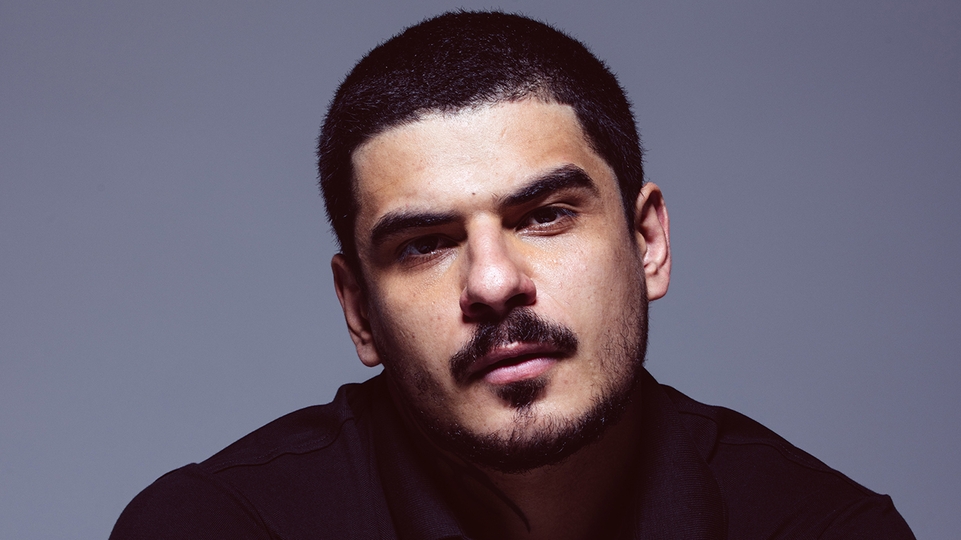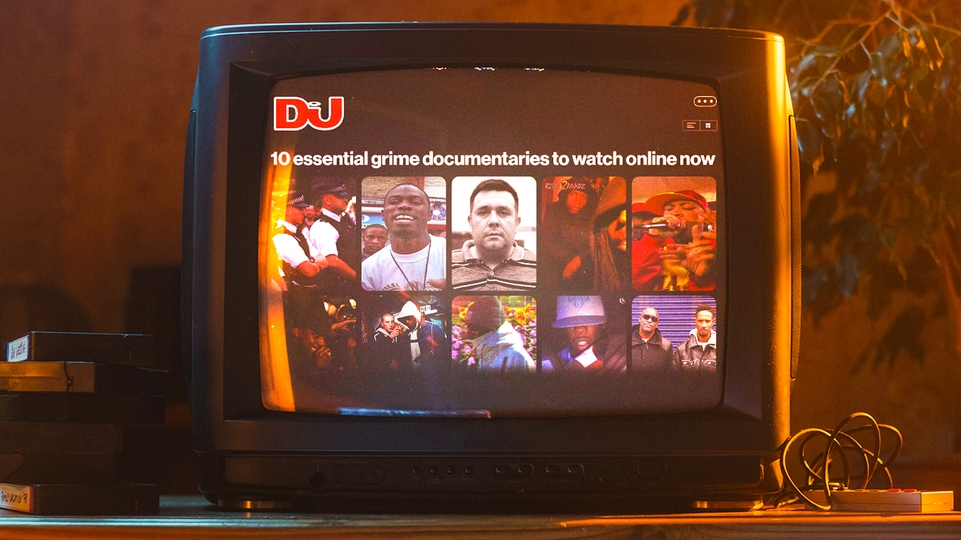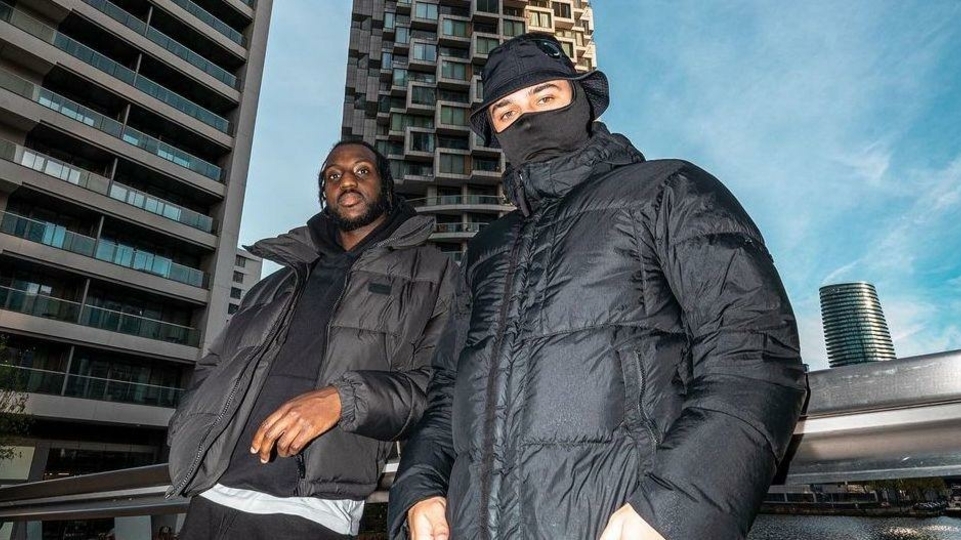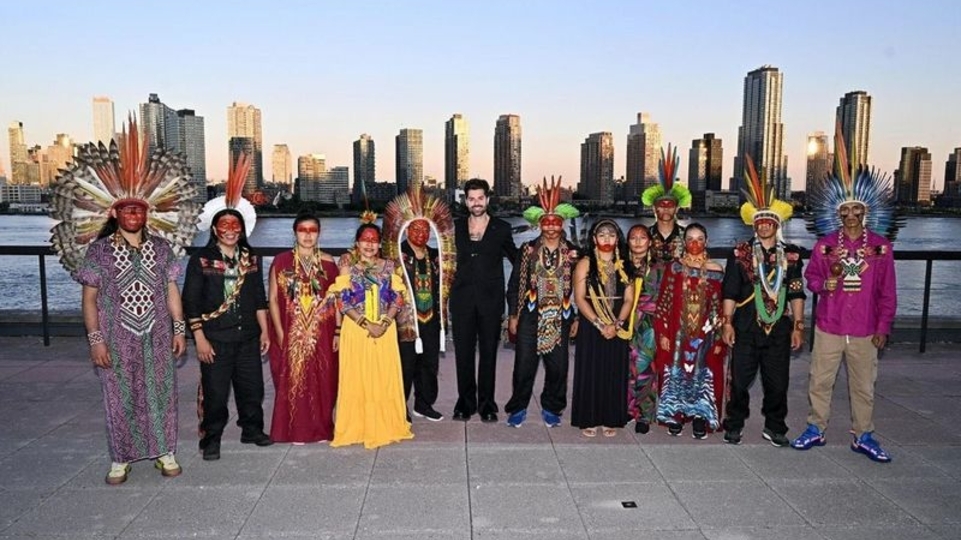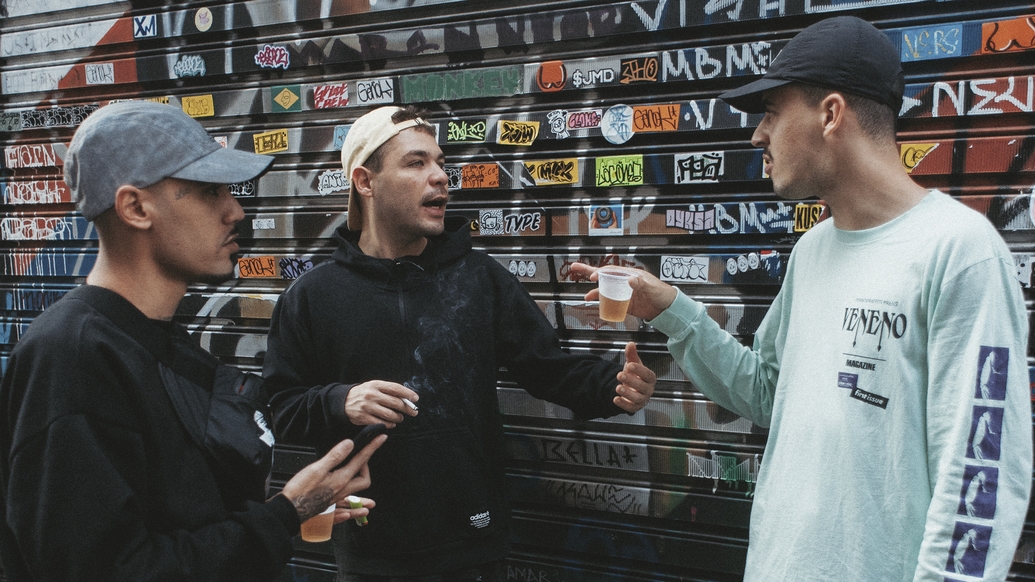
Inside the world of Brazilian grime
After discovering videos of rapid-fire MCs spitting in Portuguese over baile funk-flavoured beats, London DJ and Butterz co-founder Elijah linked up with Brazilian artists CESRV, Febem and Fleezus to re-release their ‘Brime’ EP, celebrating the unlikely yet thrilling connection between British and Brazilian grime music. DJ Mag speaks to them about how Brazilian grime artists are injecting their own humour, style and politics into the sound
In 2012 Japan hosted the Club World Cup, where the winners of that year’s Champions League played the winners of equivalent tournaments from every continent on the globe. In the final, Chelsea FC played Corinthians: a team from São Paulo, and recent winners of the South American Copa Libertadores. The English side turned up expecting to win — a group of millionaires and celebrities, clear favourites against a team scarcely known outside Brazil.
Among Chelsea’s number was their recent star signing Eden Hazard, a silky Belgian forward with a reputation for flash skills. Midway through the game, Hazard was clattered by the ageing Corinthians defender Chicão, sending the Belgian sprawling on the turf. Against all odds, Corinthians went on to win the match 1-0.
Few English football fans ever talk about this match. But the Club World Cup means something in Brazil, a country synonymous with football, but increasingly overshadowed in the club game by the financial might of Europe. The 2012 final, a moment of triumph over a British superclub, is enshrined in folklore — especially in São Paulo.
A photograph from the game, depicting Chicão’s hefty tackle on Hazard, appears on the original artwork of ‘Brime’, an EP by Brazilian producer CESRV. “The image is a metaphor,” reads an annotation on the EP’s Genius page. “The Brazilian player takes down a player representing an English team — or in other words: Brazilian artists stealing the English grime scene for Brazil.”
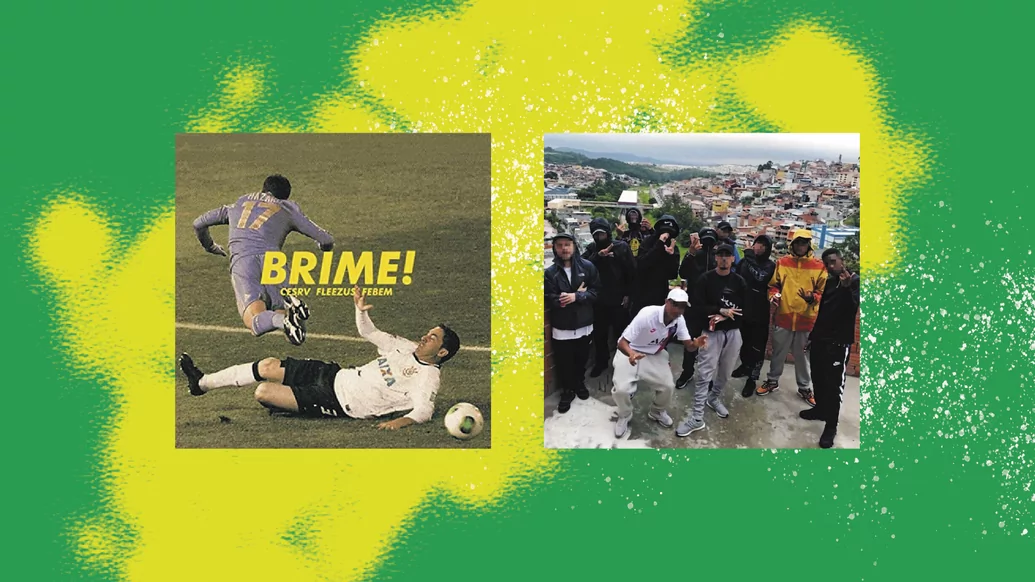

BRAZILIAN SOUND
England and Brazil may seem worlds apart, but for this story, they have things in common. Both have complicated histories of racism and oppression, leaving legacies of poverty in their densest urban areas. Both are obsessed with football. And both have produced thriving underground grime scenes. “I compare English and Brazilian grime to football,” says Fleezus. “Football was created in England and perfected by Brazilians. Same with grime.”
Fleezus speaks in Portuguese on a Zoom call from São Paulo, along with fellow rapper Febem and producer CESRV, aka Cesar. All three feature on ‘Brime’. The EP came out digitally in 2020, generating a decent amount of local buzz. This June, London grime DJs Elijah and Skilliam signed the EP to their label Butterz, releasing it on vinyl with a new cover. Chicão’s tackle is gone, replaced by a group shot of Cesar, Febem and Fleezus with their crew, the Tracksuit Mafia. They represent just one group of grime artists in Brazil.
In Salvador, capital of the northern Brazilian state Bahia, you’ll find Vandal, a rapper who was making music broadly classifiable as grime as far back as 2002, MCing over early dubstep beats by Kode9 and Skream. In Rio you’ll find DIIGO, a DJ and producer who worked on the 2020 album ‘40 ̊.40’ by fellow carioca SD9, one of the most electrifying grime records of the last few years. Also in Rio are a crew of DJs and MCs collectively known as the Brasil Grime Show, whose YouTube freestyle platform has helped spread the sound internationally.
Wiley and Skepta are among those who have shared and commented on the Brasil Grime Show online. It’s also how Elijah first came across Brazilian grime. “I was just watching those videos as a fan, for ages,” he says, “and I was fascinated. Then I heard ‘Brime’. That was like the most complete kind of project so far.”
As per its title, ‘Brime’ is an exhibition of the Brazilian grime sound. Influenced as much by the Brazilian dance sound baile funk as by British grime, featuring occasional drill basslines and even UK garage beats, it’s a world away from the grime of the early ’00s. Whereas early UK grime artists avoided singalong choruses, put off by the perceived cheesiness of garage, Brazilian grime artists are unafraid of a poppy vocal, like on ‘Brime’ track ‘SOHO’.
“In grime, you can’t really pick out many points where people are just singing,” says Elijah. “But a lot of the hooks on ‘Brime’ are sung. It’s very rhythmic, very glidey, just combining like wavey elements. It’s not cheesy, but they’re appreciating the balance of what you need to make a song sound good.”
The baile funk influence also gives every beat a party vibe, conjuring images of street festivities and Carnaval. To anyone who doesn’t speak Portuguese, it’s easy to mistake Brazilian grime for feel-good music. But this is a misconception. “If there’s anything that separates English grime from Brazilian grime, maybe it’s the mood of the beat,” says Febem. “And because we have more funk horns, maybe it might seem like it’s happier, but the lyrical themes are usually the same as any MC in the world: problems, survival.”
Febem and Fleezus rap about everything from football to politics, offering witty commentary on the life of a young Brazilian. Before ‘Brime’, both came up making music more broadly classifiable as hip-hop, releasing EPs and mixtapes on a number of small Brazilian labels from about 2016. On his local 2018 hit ‘Esse é o meu estilo’ (‘This is my style’), Febem raps: “Never surrender to please the white hipsters, whose apartments are paid for by their mums.” Cesar and Fleezus can be seen throwing up middle fingers in the video.
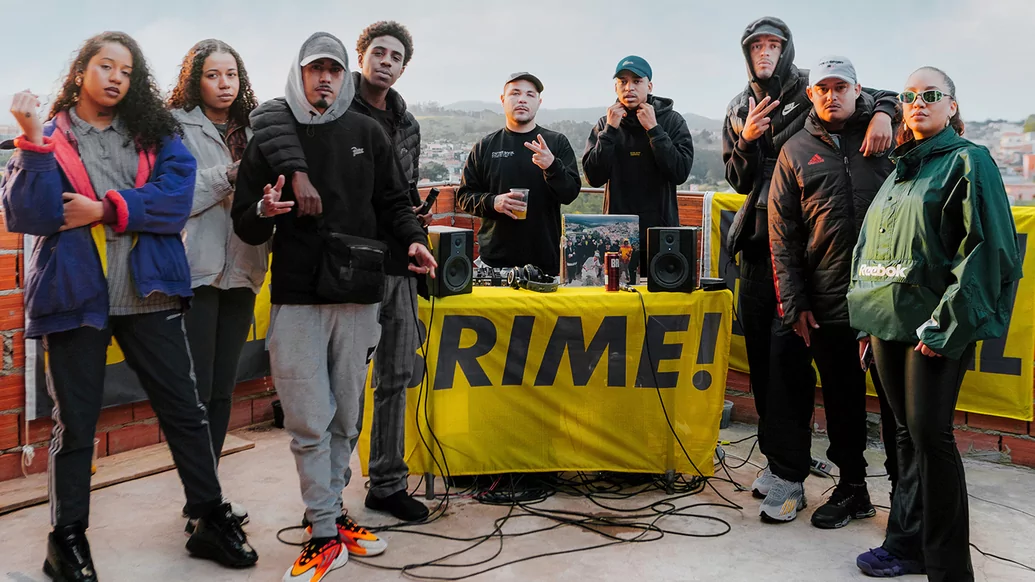
ORIGINS
After hearing the ‘Brime’ EP, Elijah reached out to the artists on Instagram. He and Cesar got on well, owing to the Brazilian’s deep knowledge of UK club music. “I’ve followed Butterz for more than 10 years now,” says Cesar, mentioning Elijah and Skilliam’s radio shows on Rinse FM in the early 2010s. “It’s crazy. When they contacted us, we really didn’t believe it.”
Cesar is an obsessive music fan. When he left school, he played in several bands, then started DJing around 2010, playing a mix of club sounds from around the world — including jungle, dubstep and grime. It was while DJing that Cesar met Febem, a young rapper who had grown up in the southern São Paulo region of Diadema. As a kid, Febem had listened to samba, baile funk and Racionais MC’s, a São Paulo rap crew and enduring giants of Brazilian hip-hop. Living in a poor area on the outskirts of the city, Febem faced a number of challenges.
“Many of my friends were lost to crime,” he says. “But it was a school of life for me. When I was very young and my brother got involved in crime, my mother introduced me to the city’s Centro Cultural.” At São Paulo’s cultural centre — a complex with a library, art gallery and theatre — Febem met some of the city’s most creative young people. “That’s how I got to know music and started getting involved in hip-hop culture. Hip-hop practically saved my life.”
Febem left school at 16, without finishing his final year. “I preferred working,” he says. “I worked on everything. I did deliveries, worked in a supermarket, laid bricks.” In his early twenties he started rapping. He met Cesar at a party called Colab 011, and they soon started working together. Febem says his introduction to grime proper was Skepta’s ‘It Ain’t Safe’ in 2014, but that he used to listen to online streams by British DJ Benji B without realising what it was. He was also intrigued by the beats in Cesar’s sets. “We need to start making grime tracks,” he told him. Cesar protested: “Bro, nobody fucks with grime in Brazil.” Febem insisted: “One day people will fuck with grime in Brazil. Let’s do it.”
So they did. It wasn’t straightforward, though: with clubs in Brazil largely split between hip-hop and electronic music, any DJ playing grime struggled to please either crowd. It wasn’t until 2018 that they had something resembling a scene. Cesar cites the start of the Brasil Grime Show, an online platform offering an alternative to stubborn club crowds, as a key moment. Rappers like Febem would guest on the show; rapping directly to camera, backed by a live DJ, over a 20-minute set.
“Look at it this way,” says Elijah. “I thought the format of the Brasil Grime Show was better than anything in the UK in terms of freestyle platforms. The way they spit to the camera, it’s kind of like a grime set, but it’s not set up like radio in the same way. The energy is high all the time.
You get all different types of MCs that are not used to the beats. So it’s kind of raw, it’s not that sharp sometimes.” Elijah doesn’t speak Portuguese, but started following MCs out of appreciation for the patterns and cadences in their rapping. “I started following a few of them on Instagram, asking questions like, ‘Why is everyone wearing football kits?!’ That was the first time I commented; on one of the early Brasil Grime Show Instagram posts. I was just confused. This guy was wearing a Celtic FC kit.”
That guy was Fleezus, MCing alongside Febem in January 2019 on one of the Brasil Grime Show’s most popular episodes. Fleezus grew up in the north-western São Paulo district of Jaraguá, and was introduced to music through his church. “Since I was a kid I was involved with music,” he says. “Music took me out of the criminal world too.”
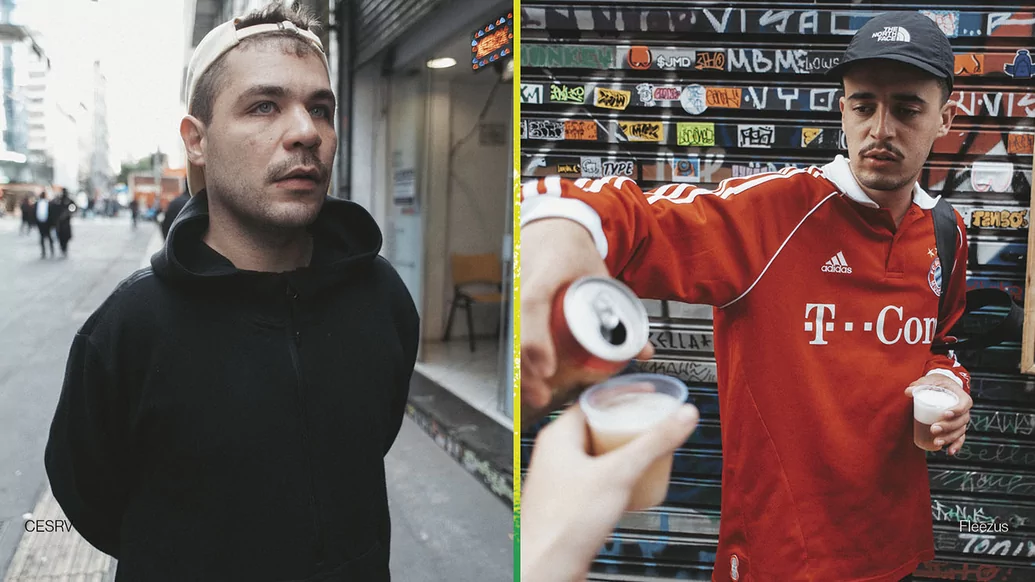

“Grime for me is a lifestyle, the way we behave, the way we think... Grime is not just a musical genre. It’s the artists’ life as well" — Fleezus
STRUGGLE
The conditions that birthed grime in Brazil are eerily similar to those that gave rise to the sound in London. As well as being subjected to poverty and densely-populated city housing, Brazil’s Black population is also routinely persecuted by police.
In May this year, thousands protested around the country after a police raid in Rio left 28 people dead, including — as human rights activists have claimed — people who had surrendered to police and were not under investigation. Black Brazilians are three times more likely to be killed by police than white Brazilians. “O POVO PRETO QUER VIVER!” read one São Paulo protester’s sign: “BLACK PEOPLE WANT TO LIVE!”
“Everything white people do, the young Black man has to do twice as much,” says Febem, citing Malcolm X. “For your place in the sun, you have to work twice as much, study twice as much, and even then it’s very difficult. Not to mention that a young Black man in the outskirts of a city can die for free.”
The parallels with the UK are not lost on the artists. Speaking to Resident Advisor last year, Febem said of British grime MCs: “They also face racism, they also live in rough areas, they also need to hustle, they also face police brutality.”
Rappers from trap, funk and grime are criminalised by police, while several high-profile MCs have been murdered in the last decade — including São Paulo’s MC Daleste, who was fatally shot on stage in 2013. On the garage-influenced ‘Brime’ track ‘TERCEIRO MUNDO’, Fleezus raps the hook: “aqui, nós tira água de pedra” — “here, we get water from stone”; or “we achieve the impossible”. The song also includes reference to Carlos Marighella, a Brazilian revolutionary who rebelled against Brazil’s military dictatorship in the 1960s, and was later assassinated. “He fought for the freedom of the people and was tried as a terrorist,” Febem explains, comparing Marighella’s story with the plight of a rapper. “Anything that contradicts the elite is marginalised. That’s what our music is about.”
The song’s title — meaning ‘third world’ — is another social comment. “That’s the way the world sees Brazil,” says Cesar. “Brazil is a ‘third-world country’. But for us, it’s the first world. It’s the only world we have. We were like, ‘Okay, let’s do music that people can relate to abroad’. But that song ended up bringing UK garage to Brazil, and showing people around the world what Brazil looks like.”
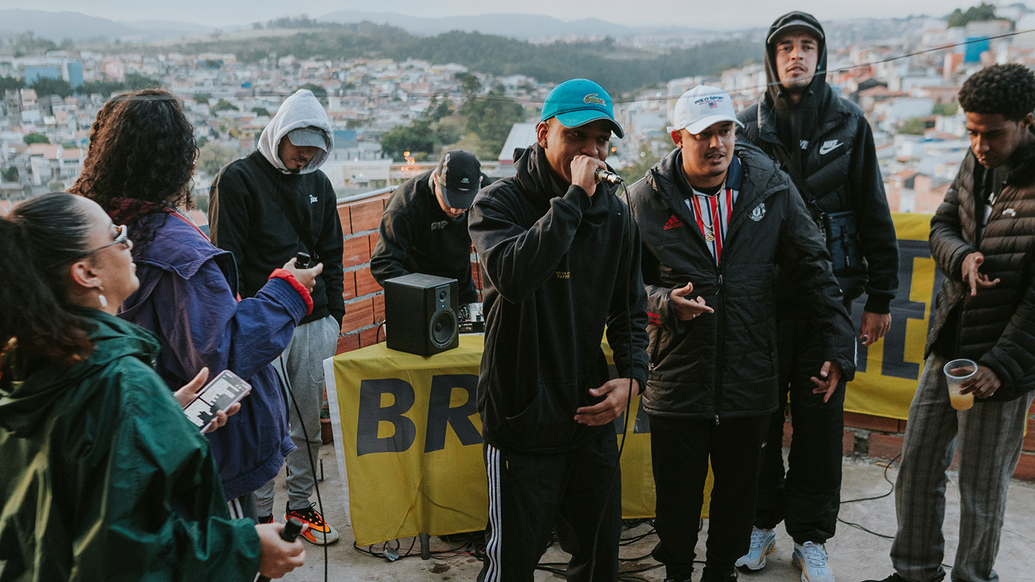
Grime remains an underground sound in Brazil, still vastly overshadowed by trap and mainstream hip-hop. But Cesar notes grime’s similarities with baile funk, which grew out of Rio’s favelas in the 1980s.
“I always told myself that grime is England’s funk. For 15 years, funk in Brazil was extremely marginalised. Now it has become mainstream. So I think everyone hearing grime, after hearing funk, understood the similarity.” Parties like Grime Execution and Wobble in Rio, and Colab in São Paulo, have kept the sound going. They have since been halted by the pandemic (except for a few illegal raves, which Cesar and the gang refuse to play), but while British grime has faltered without its natural habitat, the Brazilian scene continues to simmer online thanks to YouTube channels like BGS, Rap TV and Podpah.
As it keeps evolving, meshing with funk, trap and drill, debates persist over what grime actually means in 2021. “The difference with grime is that still, 20 years on, no one can give you a definition of it; like, ‘This is how you make a grime song’,” says Elijah. “You can go onto Google and say, ‘drill-type beat’, and make one and it’ll sound hard. With grime it’s like, ‘that’s not grime’, ‘that is grime’. It’s never been clearly defined, which has a magic to it. For the people who love grime, that’s what they love about it. But everyone else is like, ‘What the fuck is grime?!’”
Similar debates take place in Brazil. Fans fuss over where the borders lie between grime, garage, drum & bass and hip-hop, but neither Elijah, Cesar, Febem or Fleezus are purists in that sense. “That’s why we did ‘Brime’,” says Cesar. “We don’t care if you think ‘Oh this is grime, this is not’.”
Fleezus puts it simply: “Grime for me is a lifestyle, the way we behave, the way we think.” He says grime used to be definable by its sonics alone, but after visiting London in 2019 he began noticing common styles and attitudes among grime artists on both sides of the Atlantic. “Grime is not just a musical genre. It’s the artists’ life as well.” Now ‘Brime’ is out around the world, Elijah says he hopes to work with Cesar, Febem and Fleezus again soon. Like many artists in Britain, they are now tentatively planning a return to the rave. But, also like Britain, that depends on their divisive leader. “We’re fucked up in Brazil,” says Cesar. “We have a fucking clown as a president.”

